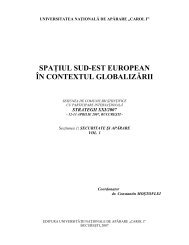PROVOCĂRI LA ADRESA SECURITĂŢII ŞI STRATEGIEI LA ÎNCEPUTUL SECOLULUI XXI
provocări la adresa securităţii şi strategiei la începutul secolului xxi
provocări la adresa securităţii şi strategiei la începutul secolului xxi
Create successful ePaper yourself
Turn your PDF publications into a flip-book with our unique Google optimized e-Paper software.
the only Caucasus state to have renewed its commitment for another five<br />
years in 1999.<br />
Figura 1 Regiunea Mării Negre Extinsă<br />
Though Armenia participates in PfP, NATO membership remains<br />
controversial because of unresolved problems with Turkey and Azerbaijan.<br />
Armenia has close relations with Greece, Romania, and Bulgaria and<br />
remains very close to Russia.<br />
Figura 2 Armenia<br />
Armenia<br />
Security problems:<br />
Armenia supports ethnic Armenian secessionists in<br />
Nagorno-Karabakh and militarily occupies 16% of Azerbaijan -<br />
Organization for Security and Cooperation in Europe (OSCE)<br />
continues to mediate dispute; border with Turkey remains closed<br />
over Nagorno-Karabakh dispute; traditional demands regarding<br />
former Armenian lands in Turkey have subsided; ethnic<br />
Armenian groups in Javakheti region of Georgia seek greater<br />
autonomy from the new Georgian Government.<br />
Nagorno-Karabakh has never legally belonged to<br />
Azerbaijan or constituted a part of it.<br />
The ongoing conflict with Azerbaijan over the ethnic<br />
Armenian-dominated region of Nagorno-Karabakh and the<br />
break-up of the centrally directed economic system of the former<br />
Soviet Union contributed to a severe economic decline in the<br />
early 1990s.<br />
Armenia participates in PfP.<br />
Figura 3 Azerbaijan<br />
Azerbaijan<br />
Security problems:<br />
Organization for Security and<br />
Cooperation in Europe (OSCE) continues<br />
to mediate dispute between Azerbaijan<br />
and Armenia.<br />
Nagorno-Karabakh dispute<br />
represent 16% of Azerbaijan.<br />
Azerbaijan oil has been<br />
pumped through the oil pipelines<br />
stretching across the Russian territory to<br />
the seaport of Novorossiysk in the Black<br />
Sea.<br />
Another pipeline is across the<br />
Georgian territory to the seaport of Supsa<br />
which is also located on the Black Sea<br />
coast.<br />
Azerbaijan hopes to resolve<br />
the Nagorno-Karabakh issue through its<br />
„oil diplomacy”.<br />
Nagorno-Karabakh was the<br />
only autonomous region of the former<br />
URSS. Nagorno-Karabakh was the only<br />
autonomous region of the former URSS.<br />
Armenia participates in PfP.<br />
The oil factor has never been and will never constitute the crucial<br />
element of the conflict, either for Karabakh or Armenia. The Karabakh issue<br />
must not be leveled down to the issue of economic benefits of the third<br />
countries [5].<br />
The solution to the Karabakh conflict is still far from its end.<br />
Because of the tough position of the Azerbaijan authorities inspired by the<br />
oil projects, as distinct from Russian authorities in the case of Chechnya and<br />
the Georgian authorities in the case of Abkhazia, Azerbaijan refused to<br />
recognize Nagorno-Karabakh as a party to conflict, neglecting the existing<br />
political and legal realities and avoid direct negotiations [6]. It negotiates the<br />
Nagorno-Karabakh status with third countries and oil companies.<br />
Both Azerbaijan and Georgia withdrew from the CIS in 1999.<br />
Azerbaijan remains in conflict with Armenia over Nagorno-Karabakh and<br />
has problems with terrorism, drugs, crime, and human trafficking.<br />
An original signatory of the 1992 Tashkent Commonwealth of<br />
Independent States (CIS) Collective Security Treaty with Russia, Armenia is<br />
283<br />
284



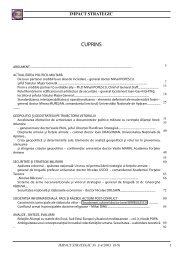

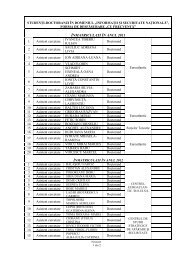
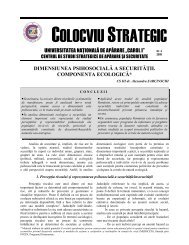
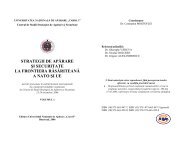
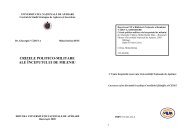
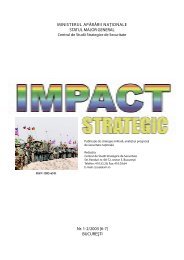



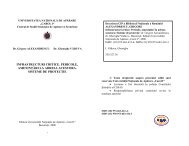
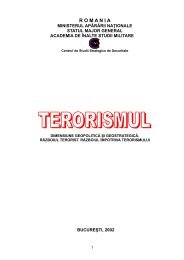

![„CAROL Nr 4 [29]/2008](https://img.yumpu.com/53801719/1/184x260/carol-nr-4-29-2008.jpg?quality=85)
